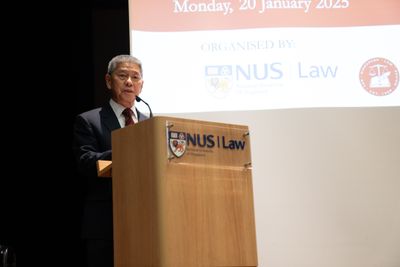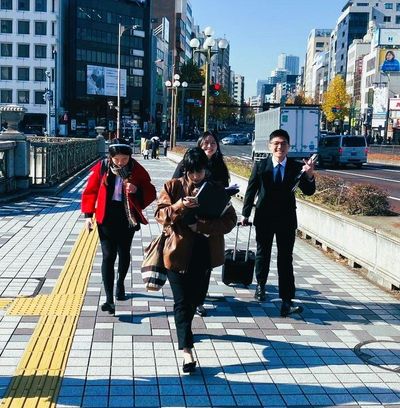On 31st August 2018, NUS Law Criminal Justice Club (CJC) hosted its annual flagship Criminal Justice Conference. This year’s topic centered on the rehabilitation of criminals and how sentencing in Singapore has evolved over the past decades. This year’s panel was an illustrious one, with diverse views and experiences.
The panelists included Professor Amirthalingam Kumaralingam and Associate Professor Ho Peng Kee of NUS, Mr Josephus Tan of Invictus Law Corporation, Ms Wong Ai Ai from the Yellow Ribbon Fund, Mr Lee Chin Soon from the Ministry of Social and Family Development, and Mr Kow Keng Siong of the Attorney-General’s Chambers.

[su_spoiler title=”The Panelists (click to expand)” style=”simple”]Professor Kumaralingam, who has been with NUS for eighteen years, is presently Chair of the NUS Teaching Academy and serves on various University and Faculty committees. His research is primarily focused on criminal law and justice, and the role of the Public Prosecutor in particular. Professor Kumaralingam also conducts research on tort law, where he specialises in medical liability and economic loss.
A/P Ho is not only a faculty member, but was also previously Senior Minister of State in the Ministry of Law and Ministry of Home Affairs, and a Member of Parliament representing Nee Soon East Single Member Constituency. Further, he is an active advocate of the Yellow Ribbon Project and the Singapore Corporation of Rehabilitative Enterprise (SCORE); both projects are targeted at easing the reintegration of ex-prisoners into society. A/P Ho has also chaired in committees relating to reducing youth crime and facilitating the rehabilitation and reintegration of ex-offenders.
Mr Tan, the Managing Director of Invictus Law Corporation, specialises in criminal defence work and has experience representing clients in all levels of the Singapore courts. He is currently serving as the Chairman of the Law Awareness Committee and was recently appointed by the President of Singapore to serve as a Panel Advisor to the Youth Court. Mr Tan has also received numerous accolades for his prolific contributions in pro bono work are also widely recognised.
Ms Wong is the Chairman of the Yellow Ribbon Fund, which supports and facilitates the reintegration of ex-offenders back into society by providing financial and residential support as well as working to reconnect families through programmes such as the Yellow Brick Road. Ms Wong is currently a practicing lawyer in the field of Merger & Acquisitions. She is alsoa member of the Baker McKenzie’s Global Executive Committee and deputy chair of the Asia Pacific Region.
Mr Lee is the director for Youth Residential Service under the Rehabilitation and Protection Group of the MSF. The Youth Residential Service is responsible for the rehabilitation, protection and reintegration of youth placed in secure care at the Singapore Boys’ Home and Singapore Girls’ Home. These Homes are not only gazetted as Juvenile Rehabilitation Centres for youth offenders dealt with by the Youth Court but also as Places of Safety for youths who are beyond parental control or in need of care or protection. Through these programmes, the organisation prepares youths to re-integrate into the community and lead meaningful lives.
Mr Kow is currently the Chief Prosecutor of the Attorney-General’s Chambers Criminal Justice Division. He also currently teaches Advanced Criminal Legal Process at NUS Law, and has He has taught Criminal Law in SMU and is a member of the Programme Advisory Committee of the School of Law, Singapore University of Social Sciences. He has also published academic texts relating to the field of criminal law.
[/su_spoiler]
The Mini-Lecture Series

The mini-lecture series kicked off with Professor Kumaralingam giving an overview of the crime control model that Singapore subscribes to, and the policy and philosophy underlying it. He brought the audience on a narrative journey through the existing rehabilitative strategies employed pre-trial to post-release. He went on to discuss diversionary programmes in Singapore, specifically those targeted at youths and the disabled. Professor Kumar then concluded his lecture by leaving his audience with two questions to ponder: “What is crime?” and “Who are criminals?”.

A/P Ho carried on by examining the current rehabilitative landscape in Singapore. He argued that rehabilitative processes were currently holistic, comprehensive and sustainable. As he shared, he believes that Singapore’s rehabilitative landscape has ample programmes that cater towards the varying needs for rehabilitation of criminals. From his perspective, a lot was already being done, but it was the responsibility of ex-offenders to make the best use of those opportunities.

Mr Kow Keng Siong then proceeded to weigh in on the issue, addressing common misconceptions on rehabilitation. He identified some principles and refuted other misconceptions, namely that:
- Rehabilitation should always be the first sentencing consideration.
- All offenders can be rehabilitated.
- Rehabilitation is suitable for all types of crimes.
- The Prosecution should not prosecute when there is strong rehabilitative potential.
- Rehabilitation can take place in prisons.
When speaking on the misconceptions, Mr Koh asked the audience to ponder the question of what the attitudes of fellow Singaporeans like with regards to punishment and rehabilitation.

Next up was Mr Josephus Tan, who gave a contrasting perspective on the issue. As a practicing criminal defence lawyer, Mr Tan provided valuable first-hand accounts on criminal justice and rehabilitation. Citing examples of mentally impaired offenders and juveniles, Mr Tan argued that it was difficult to ensure that real legislative intent has practical benefits when it comes to rehabilitation.

In her capacity as Chairman of the Yellow Ribbon Project, Mrs Wong shared her perspective on rehabilitation. She elaborated on key programmes in the Yellow Ribbon and shared her insights on how those programmes operate in tandem with existing government initiatives. She highlighted how the Yellow Ribbon’s programmes aim to provide assistance to both offenders and those they interact with, like family members.

To close off the lecture, the microphone was passed to Mr Lee Chin Soon from the Ministry of Social and Family Development, who provided a comprehensive explanation on the reintegration of ex-offenders into society, and the importance of their family and surrounding community in the reintegration process.

The mini-lecture series was followed by an engaging question-and-answer session. Many interesting queries were raised to the panellists, including questions on how we should treat mentally disabled offenders, how we should ensure the number of ‘technical criminals’ goes down, and how we should improve rehabilitative efforts in Singapore. The panellists also shared their personal perspectives on how they envisioned rehabilitation in Singapore in the future.







